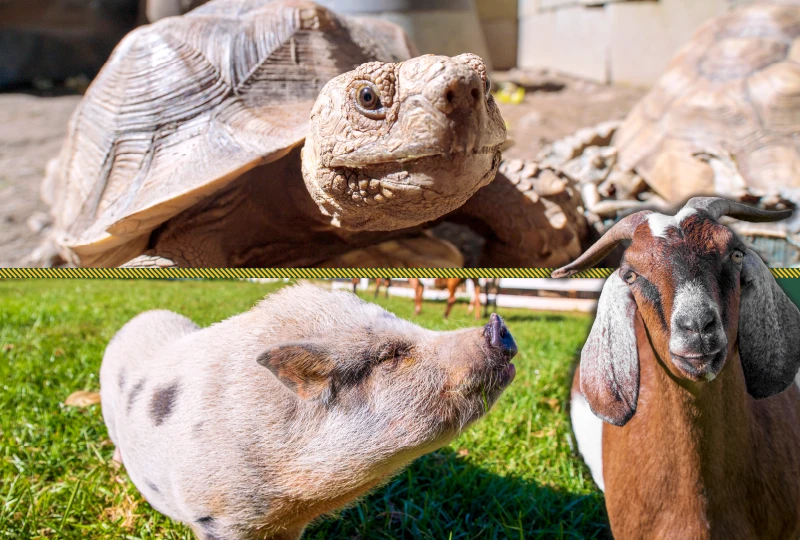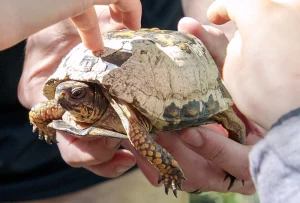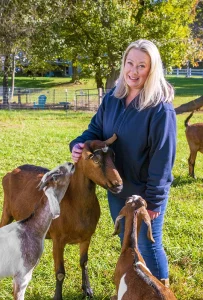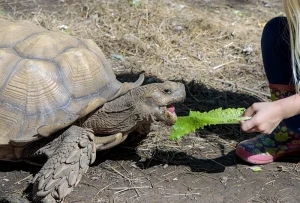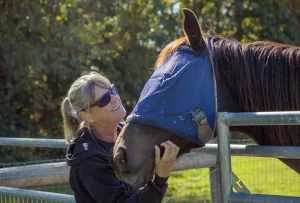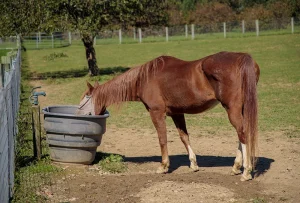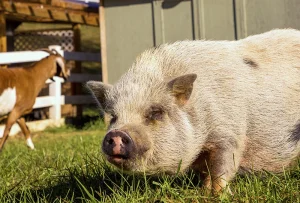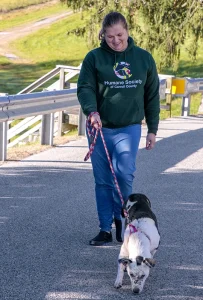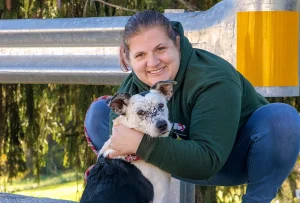by Lisa Gregory, photography by Nikola Tzenov
Hooves, Snouts & Shells
The Passionate Work of Local Rescuers
Carroll County is a community of caring. When you think about animal rescues, dogs and cats typically come to mind. But other types of animals call Carroll County home, and many individuals give their time and resources to help these animals in need.
Down On The Turtle Farm
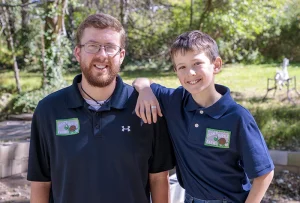
Dean Pennington with his son, Dean, offers a refuge for various turtles and other reptiles at Dean’s Turtle Farm.
Dean Pennington’s interest in turtles began when he was a boy. “I used to catch snapping turtles,” he says. “I would catch them, keep them for a bit and then let them go.”
His aunt, who owned a pet store in Union Bridge, once gave him a red-eared slider turtle. “I’ve had turtles ever since,” he says.
Today, Pennington is a dad with children of his own and 75 turtles under his care. All but five of them are rescues. Through Dean’s Turtle Farm, located at his home between Westminster and Taneytown, Pennington offers a refuge for various turtles, including tortoises and pythons, a bearded dragon and 10 axolotls, among other reptiles.
Meet Sheldon, an 11-year-old male sulcata or African-spurred tortoise whose owner passed away. “I got the tortoise from a family member when she posted on a sulcata page,” says Pennington. The woman kept Sheldon for several years after her brother’s death, and it was not easy to let go. However, “It was too big and too much for her,” says Pennington. “So, it ended up with me. It was an emotional handoff.”
Belle, a red-footed tortoise, lived with a couple for nearly 40 years in Queens, New York. As the couple grew older, “their family was trying to find Belle a good home,” says Pennington. Pennington saw an ad on Craigslist for Belle. “I was told that Belle was left as a baby turtle at a veterinarian’s office where a family member worked in New York City in the 1980s,” he says. Pennington couldn’t say no, and he drove to Queens to bring Belle back to the turtle farm.
The red-eared slider is the most common turtle Pennington has in his care. “I have about 30 right now,” he says. Until he can create additional habitats, he will not be taking more at this time. According to Pennington, red-eared sliders, which are not native to the area and are considered an invasive species, are prolific breeders and hearty survivors. “They are on every continent in the world except Antarctica,” he says.
As such, they are a ready commodity. “People are selling red-eared sliders on the streets in Baltimore City,” says Pennington. “They are given out as carnival prizes.”
In an effort to educate others about the responsibility of caring for these creatures, Pennington offers visits to the rescue for a fee. The most popular part of the tour for many is visiting the sulcata, which can live for 100 years and weigh 100 pounds. Sulcatas are not shy about gently bumping up against a visitor’s foot or leg to get a piece of hand-fed lettuce.
Although Dean’s Turtle Farm isn’t a nonprofit, it has an Amazon wish list and accepts donations. People can adopt some of the animals, while others, such as a diamondback terrapin, are part of Pennington’s private collection and are available to view only.
“I like animals. My kids like animals. So, why not? The more the merrier,” he says.
No Horse Left Behind
Just as Pennington cares for turtles, Melanie Biemiller is smitten with horses.
Until recently, Biemiller was the executive director of the Maryland Horse Rescue and now serves as president of its board. “How can you not love horses?” she asks. For Biemiller and the Maryland Horse Rescue, that means all horses, including those that are blind and elderly. The organization follows its motto “no horse left behind.”
The rescue, operated only by volunteers, is dependent on donations. According to Tina Davis, the rescue’s executive director, grain to feed the horses can cost $2,300 a month. Located between Westminster and Taneytown, the Maryland Horse Rescue is currently caring for 36 horses.
Since 2000, countless horses have come to the rescue, each with its own story. A one-eyed donkey named Helen spent much of her life pulling a fruit and vegetable cart in Baltimore. Cam came along with his mother—unbeknownst to the rescue. “She was pregnant when she got here,” says Biemiller. “He was our shining star during COVID. Our volunteer base came together to celebrate a little baby horse.”
Tucker’s legacy goes beyond the confines of the Maryland Horse Rescue itself. Tucker came to the rescue filthy, blind, old and skinny, and he desperately needed dental care.
Biemiller shared Tucker’s story on Facebook, where Myles Hopton, an equine dentist from the Virginia-based Pegasus Equine Services, saw it. He took care of Tucker for free. Inspired by this encounter, Hopton returned to the rescue with several equine dentists to provide free dental work for all of the horses. He’s also created a philanthropic effort to bring together dentists to offer free dental care to other rescues.
The horses at the rescue can be adopted, and some have found new homes. Others will remain at the rescue all their lives. People can also sponsor a horse for its needs and care.
Sometimes, horses at the Maryland Horse Rescue find homes with their rescuers.
“Charlotte was the most terrified horse I’ve ever met,” says Biemiller. Charlotte came from a horrific animal welfare situation in Garrett County. Today, she lives with Biemiller and has thrived in an environment better suited to her needs. “She is a completely different horse,” says Biemiller. “She’s become so trusting. She is a living, breathing example of why we do this.”
Goats, Sheep & Pigs, Oh My!
Missy Saul and her husband David love livestock—goats, sheep and pigs. “My husband bought me a pet pig, and that was our first farm animal,” says Saul.
When the couple moved into a home on several acres in Mount Airy, they knew they wanted to open their home to farm animals like Wilbur, their pet pot-bellied pig. The Sauls’ nonprofit, Farm Sweet Farm, relies entirely on donations. Seven pot-bellied pigs, 25 goats and three sheep call the farm home. Animals at the farm are available for adoption.
According to Saul, Farm Sweet Farm receives the most requests to take in pot-bellied pigs. “I get a call every week about a pot-bellied pig,” she says. In fact, the rescue is not taking in more at the moment.
“A few years ago, pot-bellied pigs became a fad,” says Saul, “and breeders were telling people that they wouldn’t get bigger than 35 pounds. They were calling them teacup pigs. There’s no such thing. They can get as big as 150 to 200 pounds” and even larger, she notes.
“We have taken in pigs that were so severely overweight that they had fat blindness,” says Saul. “Their fat is pushing down on their forehead, and they physically cannot open their eyes. There is also fat deafness.”
Lola, a pig residing at the farm, had a severe weight problem when the rescue took her. “Her back hooves would get stuck in her belly when she tried to walk because she was so overweight,” says Saul. “She had bruises in her stomach from her hooves.”
Saul inquired about her favorite treat from her previous owners. “Fruit Roll-Ups,” says Saul. “I thought, ‘Well, she’s not getting those here.’”
Nigerian dwarf goats were another recent fad, especially during the COVID-19 pandemic. “It seems like a lot of people during COVID got goats,” says Saul. “When COVID was over, and sports started again, and people went back to the office, we started getting a lot of those goats.”
She remembers one tiny goat that came to them, which had been one of two from private owners. “He must have been a few months old, and the people had gotten them and just set up plastic construction fencing,” says Saul. “They kept getting out. Goats are escape artists. [The owners] decided they were going to put collars on them and tie them to a tree so they couldn’t escape.” One of the goats died as a result of being tied to the tree. The surviving goat suffered from a poor diet.
But Farm Sweet Farm offers hope for these animals. Goats can become healthy and learn to scamper about again. Pigs like Lola, now half the pig she was, can learn to move freely without hooves digging into her belly.
“Lola was running the other day,” says Saul. “I thought to myself, ‘She couldn’t have done that last year.’”
For animal rescuers like Saul, moments like these are invaluable. “I see these animals go from not being healthy to being healthy or going to a forever home where they are going to get all the attention they need,” she says.
Archer’s Story
Archer doesn’t belong to Lisa Tryson but was recently her dog for a day.
“I took him by Starbucks and got him a pup cup,” says Tryson. “Three workers came to the window to say hello to him. I told them he was a shelter dog, and they couldn’t get over how sweet he was.”
Archer resides at the Humane Society of Carroll County, where he is waiting to be adopted. While shelter dogs like Archer don’t usually get days out like this, the Humane Society’s “Doggy Day Out Program” allows dogs to be treated to walks in the park, pup cups and trips to local pet stores for a few hours or an overnight stay.
Being out and about “puts eyes on a dog people might not be exposed to otherwise,” says Katie Marinello, volunteer liaison for the Humane Society. “It gives them an opportunity to really show their personality. Getting them out of the kennel is always a good thing. It’s a high-stress environment.”
The program began in 2024 and relies on volunteers to get dogs out and about. “It has been a huge, huge, huge success,” says Marinello.
Interested individuals apply to volunteer on the organization’s website and choose when they are available to take out a dog. After volunteers return with the dogs, they complete a report card. “We put that in their files so that when we are talking to potential adopters, we have more information about how the dog does when they see children, cats or other dogs,” says Marinello.
Tryson, who has three dogs of her own, hopes to schedule a Doggy Day Out once a month. “It’s a great way to help them get adopted,” she says. “You get them out into the community, show people these are amazing dogs and help them find forever homes.”
Learn more about this program at HSCarroll.org.

